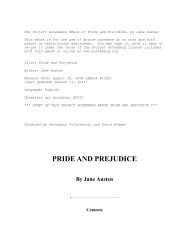pride
You also want an ePaper? Increase the reach of your titles
YUMPU automatically turns print PDFs into web optimized ePapers that Google loves.
"To Jane herself," she exclaimed, "there could be no possibility of objection; all<br />
loveliness and goodness as she is!—her understanding excellent, her mind improved, and<br />
her manners captivating. Neither could anything be urged against my father, who, though<br />
with some peculiarities, has abilities Mr. Darcy himself need not disdain, and respectability<br />
which he will probably never reach." When she thought of her mother, her confidence gave<br />
way a little; but she would not allow that any objections there had material weight with Mr.<br />
Darcy, whose <strong>pride</strong>, she was convinced, would receive a deeper wound from the want of<br />
importance in his friend's connections, than from their want of sense; and she was quite<br />
decided, at last, that he had been partly governed by this worst kind of <strong>pride</strong>, and partly by<br />
the wish of retaining Mr. Bingley for his sister.<br />
The agitation and tears which the subject occasioned, brought on a headache; and it grew<br />
so much worse towards the evening, that, added to her unwillingness to see Mr. Darcy, it<br />
determined her not to attend her cousins to Rosings, where they were engaged to drink tea.<br />
Mrs. Collins, seeing that she was really unwell, did not press her to go and as much as<br />
possible prevented her husband from pressing her; but Mr. Collins could not conceal his<br />
apprehension of Lady Catherine's being rather displeased by her staying at home.<br />
Chapter 34<br />
When they were gone, Elizabeth, as if intending to exasperate herself as much as possible<br />
against Mr. Darcy, chose for her employment the examination of all the letters which Jane<br />
had written to her since her being in Kent. They contained no actual complaint, nor was<br />
there any revival of past occurrences, or any communication of present suffering. But in all,<br />
and in almost every line of each, there was a want of that cheerfulness which had been used<br />
to characterise her style, and which, proceeding from the serenity of a mind at ease with<br />
itself and kindly disposed towards everyone, had been scarcely ever clouded. Elizabeth<br />
noticed every sentence conveying the idea of uneasiness, with an attention which it had<br />
hardly received on the first perusal. Mr. Darcy's shameful boast of what misery he had been<br />
able to inflict, gave her a keener sense of her sister's sufferings. It was some consolation to<br />
think that his visit to Rosings was to end on the day after the next—and, a still greater, that<br />
in less than a fortnight she should herself be with Jane again, and enabled to contribute to<br />
the recovery of her spirits, by all that affection could do.<br />
She could not think of Darcy's leaving Kent without remembering that his cousin was to<br />
go with him; but Colonel Fitzwilliam had made it clear that he had no intentions at all, and<br />
agreeable as he was, she did not mean to be unhappy about him.<br />
While settling this point, she was suddenly roused by the sound of the door-bell, and her<br />
spirits were a little fluttered by the idea of its being Colonel Fitzwilliam himself, who had<br />
once before called late in the evening, and might now come to inquire particularly after her.<br />
But this idea was soon banished, and her spirits were very differently affected, when, to her<br />
utter amazement, she saw Mr. Darcy walk into the room. In an hurried manner he



